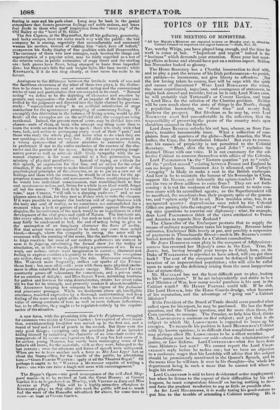Analogous to the difference between the intrinsic worth of one
and -the factitious cleverness of the other of these two plays is the distinc- tion to be drawn between real or natural acting and die conventional tricks of rant and gesticulation that are accepted in its stead. " Natural acting" we define to be the depicting of character and emotion by gesture and expression—the result or an impulse of the feelings con- trolled by the judgment and directed into the right channel by previous study : ‘ conventional acting" is an artificial substitution of stage mannerism for the spontaneous promptimse of momentary feeling. To exemplify this distinction in the instance of living actors, would be dif- ficult: all the examples are on the artificial side, the exceptions being accidental. Indeed, the present race of actors may he divided into two classes—such of them, at least, who attempt any thing inure than to learn the words set down for them to speak : those who study with what tone, look, and action to accompany every word of their " part ;" and those who study the whole play, and know what to do when they are not speaking—the latter are very few. All alike appear to proceed on a wrong system—that of minute attention to executive details, in ,prefereace if not to the entire exclusion of the essence of the cha- racter and the passion of the scene. Acting is an art requiring imagi- native power as well as mimetic skill • lively sympathy with the as- sumed character is far more essential to a fine personation than mimicry of physical peculiarities. Instead of trying an attitude for this speech, an expression for that line, and an action for the other situation, if the actor were to make himself thoroughly master of the psychological principles of the character, so as to put on a new set of feelings and ideas with the costume, he would be at no loss lbr the ap- propriate confluents of face and movement—Nature would prompt him : he would lose individual consciousness, that stumblingblock to free and spontaneous action, and, living for a while in an ideal world, forget all but the scene. " He that feels not himself the passion he would raise," says Cutunn, "will talk to a sleeping audience :" and so our players scent to think, for they rant as if they wish to wake the sleepers. Hit were possible to animate the buckram suit of stage-business with the body and soul of' reality, as we sometimes See accomplished for a moment whets a look or gesture of actual passion appears through the disguise, the incumbrance of the mask would be an impediment to a full development of' the vital grace and spirit of Nature. The histrionic art, liki every other, must have its rules ; but such as tend to defeat its end may fairly be condemned as bad, the end of acting being to give to the assumption of an imaginary character the force of reality. Not that actual tears are required to be shed, any more than actual blood,—though, where the sympathy is strong, the actor will be overcome with the cunning of the scene, like the audience: it is enough to feign emotion: but most of' our modern performers are content to seem to be feigning, substituting the formal show for the reality of simulation, or, in other words, performing a pantomime of wo. In one word, our serious actors want imagination to conceive character and feeling to express emotion adequately to the occasion. The exceptions are so few, they only serve to prove the rule. MACItEA or sometimes, Mrs. WARNER more frequently, strikes out sparks of the Promo- thean heat ; but anon all is cold : even with them mere physical excite- ment is often substituted for passionate energy. Miss HELEN FAI1CIT constantly passes off vehemence for earnestness, and a put-on smile for an emotion of delight ; and Miss Emsiss TREE, mistaking loudness for pathos and lowness for calm determination, strains her sweet voice till we fear for its strength, and presently renders it almost inaudible— Mr. ANDERSON keeping her company in the vigour of his fortissinii and pianissimi passages. While we desiderate above all, intelligible utterance, rendered expressive by a thorough understanding and deep feeling of the sense and spirit of the words, we arc nut insensible of the value of strong contrasts of tone as well as inure delicate inflections ; but, to be effective, they ought to be regulated entirely by the require- ments of the situation.


























 Previous page
Previous page